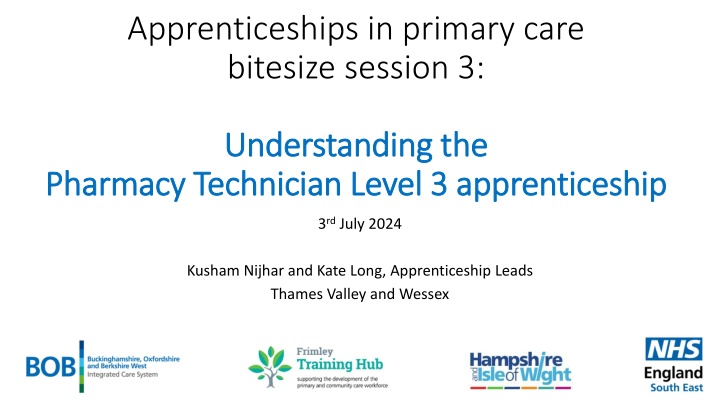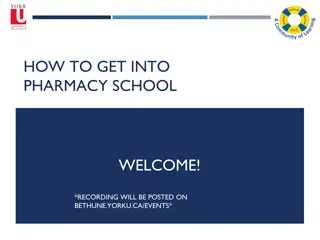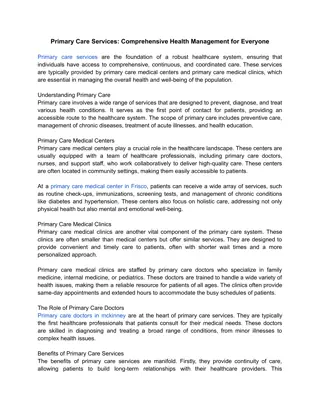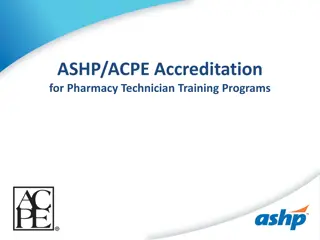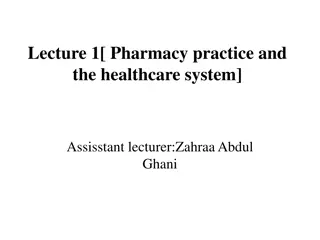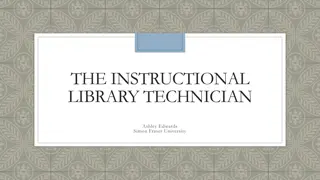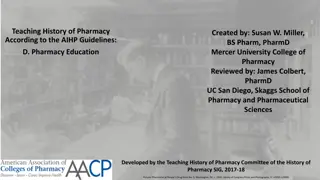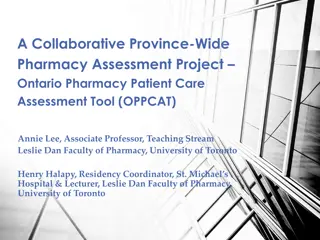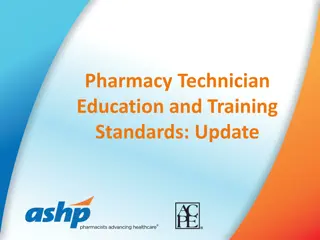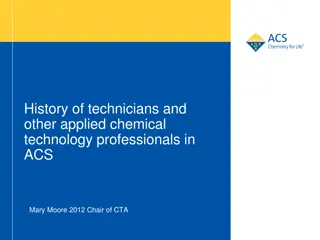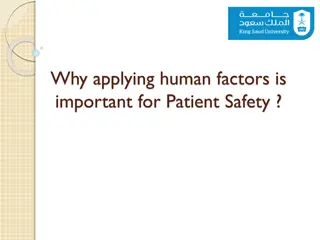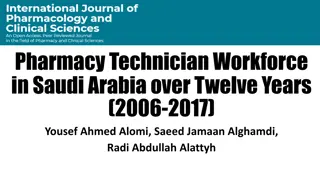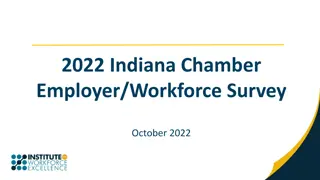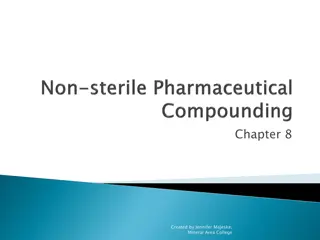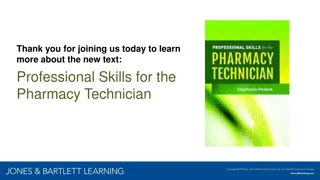Developing Pharmacy Technician Workforce in Primary Care
Explore the Pharmacy Technician Level 3 apprenticeship program aimed at expanding the primary care workforce. Learn about entry requirements, funding, and setting up the apprenticeship. Discover the benefits of investing in Pre-registration Trainee Pharmacy Technicians (PTPTs) to meet the growing demand for pharmacy technicians across various healthcare sectors.
Download Presentation

Please find below an Image/Link to download the presentation.
The content on the website is provided AS IS for your information and personal use only. It may not be sold, licensed, or shared on other websites without obtaining consent from the author.If you encounter any issues during the download, it is possible that the publisher has removed the file from their server.
You are allowed to download the files provided on this website for personal or commercial use, subject to the condition that they are used lawfully. All files are the property of their respective owners.
The content on the website is provided AS IS for your information and personal use only. It may not be sold, licensed, or shared on other websites without obtaining consent from the author.
E N D
Presentation Transcript
Apprenticeships in primary care bitesize session 3: Understanding the Understanding the Pharmacy Technician Level 3 apprenticeship Pharmacy Technician Level 3 apprenticeship 3rdJuly 2024 Kusham Nijhar and Kate Long, Apprenticeship Leads Thames Valley and Wessex
Session content Session content Expanding the pharmacy technician workforce in primary care Pre-registration Trainee Pharmacy Technician programme overview Entry requirements Ingredients for success Funding Setting-up the apprenticeship Useful contacts and links
The Pharmacy Technician apprenticeship The Pharmacy Technician apprenticeship - - growing the primary care workforce growing the primary care workforce Demand is growing for pharmacy technicians to be available to support delivery of new service models, which means that there is a growing recognition that pharmacy technicians have a key role in supporting all sectors of care. Development of multi sector training programmes for PTPTs will support workforce growth and ensure training pathways are in place for pharmacy technicians to meet the needs of the current and changing landscape.
The Pharmacy Technician apprenticeship The Pharmacy Technician apprenticeship - - growing the primary care workforce growing the primary care workforce Investing in a Pre-reg Trainee Pharmacy Technician (PTPT) is a long-term investment to grow your own workforce and will support the NHS to meet the increased demand placed on clinical services across sectors. Many organisations are struggling to recruit qualified pharmacy technicians with the required experience, particularly in sectors not traditionally associated with the role, such as in primary care networks or General Practice. Practices and PCNs can develop their existing staff, or recruit into a Trainee Pharmacy Technician role. The LTWP aims to increase the use of apprenticeships aiming to provide 22% of all training for clinical staff through apprenticeship routes by 2031/32
PTPT Programme PTPT Programme The 2-year training programme is a mixture of work-based experience, including operational and patient-facing experiences, whilst completing a vocational course. The programme enables the PTPT to meet the General Pharmaceutical Council (GPhC) standard on completion, to enable them to join the pharmacy technician register. The curriculum includes chemistry, microbiology, physiology, action and uses of medicines, law, pharmaceutics, dispensing, pharmacy production, professional practice, ethical decision making, medicines optimisation, medicine reconciliation and supply of medicines and accuracy checking.
PTPT Activities / tasks/ competencies / skills / specialist PTPT Activities / tasks/ competencies / skills / specialist training provided training provided Injections / Vaccinations Med Reviews Nursing Home visits QI Audits Device counselling Drug monitoring Patient consultations OSCEs Med rec Opioid revs Statin initiation BPs Community pharmacy referrals MOIS Shadowing QoF
Entry requirements Entry requirements Entry requirements vary depending on the apprenticeship provider. Typically, the individual will need four GCSEs or equivalent at A*-C/9-4 including mathematics, English language, science and one other subject to undertake the level 3 Pharmacy Technician (Integrated) apprenticeship. The PTPT training is available via non-apprenticeship and apprenticeship routes. The duration of the training is the same, at 24 months, the key difference with apprenticeships are: Eligibility criteria including: - The apprentice must have resided in England for a period of 3 or more years or are a resident on an eligible residency scheme - Maths and English Level 2 for this apprenticeship most programmes require grades C/4 and above for entry on to PTPT training - Be 16 years of age or older (there is no maximum age limit) - A minimum of 6 hours of-the-job learning: mixture of workshops, self-directed learning and achievement of competencies during the programme - Supervisor attendance to tri-partite review meetings The apprentice must be employed under a contract and be able to complete the apprenticeship within the time they have available, including the end-point assessment. Visa and fixed term contracts must not expire before duration of apprenticeship. The apprentice must have access to a dispensary environment where they are appropriately supervised to undertake activities relating to the assembly of prescribed items and the accuracy check of dispensed medicines and products.
Ingredients for a successful apprenticeship Ingredients for a successful apprenticeship Training provider: carefully select your training provider, you will be working with them for at least 2 years. There are different models of training available, find a provider that has good outcomes and is the best fit for your learner and business. Educational supervisor (ES): you will need a registered pharmacy professional with appropriate experience, knowledge, and capacity to support the PTPT throughout the duration of their training programme; meet the GPhC requirements for tutoring and supervision; Meet the training provider s requirements . The work-based experience must be under the supervision, direction, or guidance of a GPhC registered pharmacist or pharmacy technician to whom the trainee is directly accountable for a minimum of 14 hours per week. It is expected that the PTPT will meet their ES at least once a month to ensure holistic care, review progress and provide support to the PTPT. Placements: Provide good experiential learning opportunities. There is a requirement that the PTPT spends time in a dispensary to complete dispensing and final accuracy checking activities as part of their training. Have honest conversations the programme is intensive so there will be pressure points during the programme. It s important to catch any issues early so that you can plan and seek support. Apprentice experience
Funding Funding Funding the role: Pharmacy Technicians have been part of the Additional Roles Reimbursement Scheme (ARRS) since 2021 and at present 2,292 FTE pharmacy technicians are directly employed under the scheme (Primary care workforce quarterly update December 2023) PCNs can now use the Direct Patient Contact funding to recruit a Pharmacy Technician Apprentice to support future PCN workforce requirements, with support from their Integrated Care Boards See paragraph 8.4 of the Network Contract DES 2024/25 (england.nhs.uk) Funding the training costs: For employers that are a levy payer 100% of course fees will be funded by the levy. If you are classed as a non-levy payer you will pay 5% of the course fees, and the remaining 95% will be paid by the government. Non levy payers can access 100% of course fees through Levy Transfer.
Setting up a PTPT apprenticeship Setting up a PTPT apprenticeship Navigate training providers: - For a list of local pharmacy technician level three apprenticeship training providers, approved on the NHS Salisbury higher-level framework click here. - For NHS England guidance: england.wtepharmacy.se@nhs.net For recruiting to a new role: consider the training programme start dates and create your recruitment timeline, allowing 6-weeks to onboard your apprentice onto the training programme For an example job description click here and sample advertisement click here For existing staff: ensure they are moved into a Trainee PTPT role In addition: Set up your Digital Apprenticeship Service account Request a levy transfer if you wish to receive full funding Support is available for setting up an apprenticeship see the Useful Contacts slide.
Useful contacts and links Useful contacts and links For local support, email: england.primarycareschooltvw.se@nhs.net For NHS England guidance, email: england.wtepharmacy.se@nhs.net For all apprenticeship resources across the Thames Valley and Wessex: Apprenticeships in Primary Care - Working across Wessex (hee.nhs.uk)
Apprenticeships: information sessions Apprenticeships: information sessions 6th March Apprenticeships: What s available for Primary Care and how to get started recording : Understanding apprentices in Primary Care and how to get started. (youtube.com) 1st May Apprenticeships: Understanding levy transfers Understanding-Levy-Transfers-in-Primary-Care.pptx (live.com) 3rd July Apprenticeships: Understanding the Pharmacy Technician apprenticeship 4th September Apprenticeships: Management and Leadership 6th November Apprenticeships: Digital and Quality All sessions run from 12:30 13:00 Click here for more information and to book.
